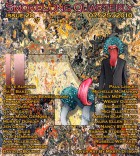Looking back, I can honestly say my life was a series of railroad tracks, tapering, melting, into a horizon that vanished as did my aunt. Gertie’s house the place my parents parked me every weekend, so they could travel into the city and keep vigilance on my baby brother born with a set of stiff lungs, something called Broncho Pulmonary Dysplasia. It was before my mother, Gertie’s sister-in-law, uttered the words, “filth,” or “bitch” or “ruined.”
Gertie would always play this game. She’d lock me in a closet for hours, until I cried, suffocating from darkness, and it was Gertie who opened the door and pulled away the obscene night, the trap of being-inside-myself, with her electric hands and her admonitions that I should call her mother when no one else was around. It was just a game, she said, but it got to a point where I couldn’t tell which mother I needed more: the good one who made me fluffy eggs, or the more powerful one with the low smoky voice.
On the bed, a block of goose feather and lemon smelling satin that calmed my hysteria, caused it to slowly sink, Gertie hovered over me, half-human, half-cunning tigress of a boy’s fantasy and half-angel hands. Those hands sailed on the surface of my body, gliding and circling, as if there was only time to kill, and eventually, I fell asleep. After waking up, a survivor of strange demons behind closets, I could not find the correct words to tell myself what actually took place and whether I was a pathetic victim or soul-murdering accomplice. Crisp Sunday mornings with a shaft on sunlight slanting across the room, Gertie’s chin rested on my forehead. Her breaths eclipsed my sensation of time.
There was a war somewhere. Gertie’s husband had become a casualty. I imagined there were others in her life, a hundred boys like me, lost at sea but from a good home. We were all part of Gertie’s extended family, her garden of flowers that could only grow up.
It went on for yearsthis thing between me and Gertie. And by the time I told my parents, because Gertie had faded away from me, because I had in some sense “grown up,” Gertie was far away. For years, I wandered on trains, taking trains to nowhere, that I should be punished for what I couldn’t refuse. And the funny thing about those swirling railroad tracks, those tracks that veer and tangle endlessly, was that they never did reach the horizon. For Gertie there was always the sea.


 The core workshop of SmokeLong Fitness is all in writing, so you can take part from anywhere at anytime. We are excited about creating a supportive, consistent and structured environment for flash writers to work on their craft in a community. We are thrilled and proud to say that our workshop participants have won, placed, or been listed in every major flash competition. Community works.
The core workshop of SmokeLong Fitness is all in writing, so you can take part from anywhere at anytime. We are excited about creating a supportive, consistent and structured environment for flash writers to work on their craft in a community. We are thrilled and proud to say that our workshop participants have won, placed, or been listed in every major flash competition. Community works.